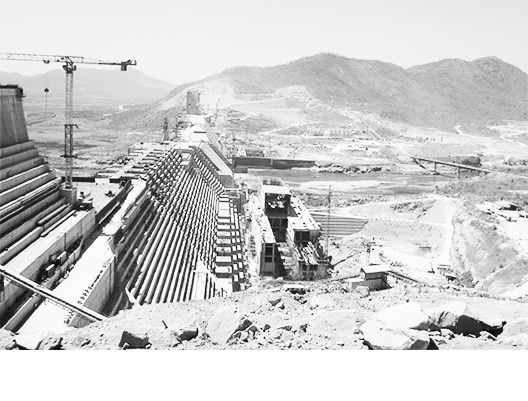
Last week’s news from Washington over the GERD negotiations between Egypt, Ethiopia and Sudan were disconcerting indeed although the final outcomes of the talks is not yet clear or officially confirmed. The final agreement is far from being signed and the Ethiopian negotiating team is doing its job in a principled way and in accordance with the ultimate interests of the country.
This should be the red line the other negotiators in the GERD dispute need to think over many times before deciding to cross it. The Ethiopian people as a whole have invested so much in political, economic as well as emotional capital, that any attempt to deviate from the path of defending Ethiopia’s national interest would be not only unacceptable but also bound to derail the talks and the eventual singing of the final agreement.
The recent Washington talks were expected to lead to a final agreement that would be signed at the end. This had galvanized both legitimate emotional reactions from the Ethiopian public as well as misplaced if not premature conclusions and speculations as to the signing of the tripartite agreement between Egypt, Sudan and Ethiopia. Some sources went as far as speculating whether the talks had been between Egypt, Sudan, the World Bank and the United States on the one hand and Ethiopia on the other.
Some even called it something like “the quartet versus the loner” or Ethiopia versus the group of four if you like. There were even misplaced and premature speculations on the social media about arms twisting and conspiracy theories. At the end of the week things became clearer and it was evident as it was clear that the final the final agreement is not yet signed.
In this age of fake news and “citizen journalism”, information is likely to travel at twice the speed of light and is refracted in the prisms of the social media. No doubt that the GERD issue galvanized so much emotions and agitated so many minds and hearts. The reasons behind last week’s wave of public agitation can be attributed to many factors, among which the presence of the US and the World Bank (WB) as facilitators or observers and the series of conspiracy theories that emanated from this.
The official version of events is that Egypt solicited US mediation efforts and the World Bank joined the talks in its capacity as observer. A couple of questions were raised in this connection both in the social and in mainstream media. A few domestic television channels hosted interviews with academicians and experts on the matter. some of them even asked why did Egypt seek US and WB presence in the talks. It is clear that the WB is an international financial institution and not a political entity with vested interests in GERD project, while it was not clear why it came to the talks invited or uninvited.
The answer might be that the US as a friend of both Ethiopia and Egypt might trusted to be an impartial observer and would not play a double role as a defender or promoter of Egyptian agenda on the GERD. Some people may think that the WB as an institution closely working with the US might be interested to influence the negotiating process by its indirectly sending a message to Ethiopia saying something like, “money will be available to finish construction of the dam in case you run short of cash” and indirectly urgently Ethiopia to sign the agreement in a way that would benefit the other parties to the talks. All this is guesswork of course.
It is to be recalled that no objection was raised when Egypt asked the US to help or facilitate the talks and the WB joined as observers. Now in retrospect, some people say that why Ethiopia first of all agreed to US and WB intervention while it could stick to its original stance of holding talks with the direct stakeholders and find another alternative together in case the talks jammed. This is actually the normal procedure. Observers should be selected by the direct stakeholders, in case that was necessary and not by Egypt alone and this made people suspicious of a kind of “backroom deal” between Egypt and the US.
Some scholars who expressed their views in the local media also said that since Ethiopia is the source of more than 80 per cent of the waters of the Nile, she had no business engaging in expensive and time consuming shuttle diplomacy. According to the same quarters, Egypt should rather talk directly to Ethiopia instead of soliciting the assistance one great power or another and respect Ethiopia’s legitimate and god given right to use its resources in whichever way it likes since Egypt did not ask anybody’s opinion when it decided to build the Aswan dam on the Nile and promte its economic development.
According to some other people who expressed their views on different domestic media channels, the assumption was that Egypt ran to the US simply because it was panicking as the fact that Ethiopia is keeping on building the GERD on its own and taking control of the entire process from beginning to end. Despite the worries and speculations, it should be made clear that the Ethiopian government has no wish to sign the final agreement without consulting the Ethiopian people who are the direct owners of the GERD project and as such the ultimate decision rests with them.
The Ethiopian government is therefore expected to bring the matter to the attention of the people and consult all the stakeholders such as political parties, church and mosque leaders, civil society groups, the media and others on how to go about before signing the agreement.
There can be no backdoor deals with a matter of such grand importance because a bad deal will adversely affect the fates of generations to come and go down in history as an act of betrayal. The matter should also be brought before parliament, openly debated with greater public participation before any conclusive decision will be taken as to the singing of the final agreement. This is what the administration is doing at present as PM Abiy Ahmed in his recent appearance before parliament, alluded to why they have delayed the signing of the final agreement, although without going into it with greater detail.
Anything can happen in the coming few weeks as the signing of the agreement would likely figure higher on the diplomatic front. US foreign minister Mike Pompeo was in Addis earlier in the week and the main itemon the agenda of his visit might be the tripartite talks and the signing of the final agreement. US president being so unpredictable and his shiftiness his policy choices, one should be guarded against possible US arm twisting or something resembling the WB has o it.
It is clear that the WB has extended badly-needed financial assistance to Ethiopia but this should not be used as a leverage to influence the talks and the final agreement on GERD. If the Americans try to deviate from their neutral diplomatic trajectory they have so far followed more or less with relative consistency, they are bound to face the disappointment and anger of the Ethiopian people who are trying to come out of age-old poverty or end their dependence on international dependence on foreign aid.
The WB is also expected to maintain equilateral distance from the negotiators and refrain from any attempt to flex its financial muscles to help secure an agreement that would benefit this or that negotiating party. If the WB resorts to taking sides in the talks, it will not only lose its credibility but also lose the trust African countries have in the institution as a partner in economic development.
It is no secret that there is a regional competition going on among the great powers to influence political and economic developments in the Horn of Africa. This may be good as far as it gives opportunities for Horn nations to choose their development partners but any attempt to woo them with this or that kind of promised advantage would only damage the great opportunities for global cooperation in helping horn countries attain economic and social developments.
Egypt is an African country with vested and historic ties with Horn countries such as Ethiopia with whom it shares not only the Nile waters but also its history since times immemorial. Any speculation about Egypt trying to force its way into getting a better deal or a one-sided deal benefiting it at the cost of the rest of the Nile riparian states, has no basis in reality.
Neither Egypt is trying to take advantage of the political difficulties in the Horn countries at this stage in order to secure a most advantageous deal for itself. This would be contrary to the spirit and letter of the African Union charter that puts emphasis on joint development of African countries rather than unilateral decision to protect one’s interests at the cost of the rest of the countries in any region.
The Ethiopian Herald Sunday Edition February 23/2020
BY MULUGETA GUDETA





